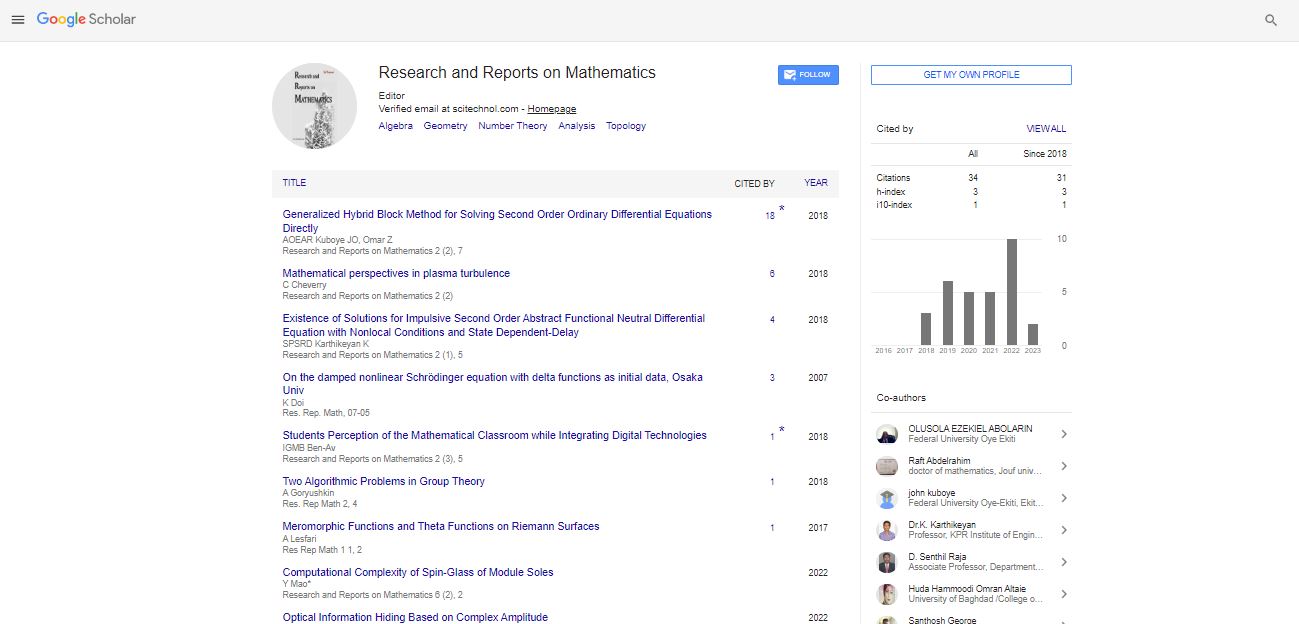Opinion Article, Res Rep Math Vol: 8 Issue: 1
Mathematics Education Analytics: A Data Science Approach
Cha Wang*
Department of Science and Mathematics Education, University of Umea, Umea, Sweden
- *Corresponding Author:
- Cha Wang
Department of Science and Mathematics Education,
University of Umea,
Umea,
Sweden
E-mail: chawang123@gmail.com
Received date: 27 October, 2023, Manuscript No. RRM-23-118496;
Editor assigned date: 30 October, 2023, PreQC No. RRM-23-118496 (PQ);
Reviewed date: 13 November, 2023, QC No. RRM-23-118496;
Revised date: 11 January, 2024, Manuscript No. RRM-23-118496 (R);
Published date: 18 January, 2024, DOI: 10.4172/rrm.1000224
Citation: Wang C (2024) Mathematics Education Analytics: A Data Science Approach. Res Rep Math 8:1.
Description
The transformative role of data science in mathematics education. In an era where data-driven decision-making is ubiquitous, harnessing the power of data analytics can significantly enhance the teaching and learning of mathematics. This paper discusses the importance of data science in education, its applications in mathematics education, and the potential benefits it offers. The methodologies, tools, and challenges involved in implementing data science approaches in math classrooms.
In recent years, data science has revolutionized numerous industries, and education is no exception. In mathematics education, data science offers a new and powerful lens through which to examine student performance, instructional strategies, and curriculum development. By harnessing the power of data analytics, educators and policymakers can make informed decisions to improve math learning outcomes.
The importance of data science in education
Data-driven decision-making is a cornerstone of effective education policy. In mathematics education, data science empowers educators to monitor student progress and tailor instruction to meet individual needs. It helps schools and districts allocate resources more efficiently and prioritize areas that need improvement.
Data science allows for early intervention in cases of struggling students. By analyzing performance data, educators can identify atrisk students and provide targeted support, reducing dropout rates and improving math proficiency.
Applications in mathematics education
One of the most significant benefits of data science in mathematics education is the ability to personalize learning. Adaptive learning platforms use data to create tailored curricula, ensuring that each student receives the instruction they need, when they need it.
Data analytics can uncover trends in student performance and help refine curriculum. Educators can identify which concepts students find challenging and adapt instructional materials accordingly. This iterative process ensures that curriculum is dynamic and responsive to student needs.
Assessments are a critical component of math education. Data science can streamline the assessment process, providing real-time feedback to both students and teachers. This immediate feedback can help identify misconceptions, allowing educators to address them promptly.
Data collection is the foundation of data science. In mathematics education, data can be collected from various sources, including standardized tests, classroom assignments, online learning platforms, and student information systems.
Data analysis involves statistical techniques to extract meaningful insights from the collected data. In math education, this can include measuring student performance, identifying trends, and evaluating the effectiveness of teaching strategies.
Predictive modeling uses historical data to forecast future outcomes. In math education, this can help identify students at risk of falling behind and enable early intervention.
Machine learning algorithms can be employed to personalize learning paths for students, recommend resources, and provide targeted feedback. Artificial intelligence can enhance the educational experience, making it more engaging and effective.
As with any powerful tool, data science in mathematics education comes with challenges and ethical considerations. Ensuring data privacy, maintaining transparency, and addressing potential biases are essential aspects of responsible data usage in education.
Conclusion
Data science has the potential to revolutionize mathematics education. By harnessing data analytics, educators can personalize learning, refine curriculum, and make data-driven decisions. However, it is crucial to address challenges and ethical concerns to ensure responsible and effective implementation.
In closing, the marriage of data science and mathematics education offers exciting possibilities for improving student outcomes and fostering a deeper understanding of mathematical concepts. Embracing this data-driven approach can unlock the full potential of math education in the 21st century.
 Spanish
Spanish  Chinese
Chinese  Russian
Russian  German
German  French
French  Japanese
Japanese  Portuguese
Portuguese  Hindi
Hindi 